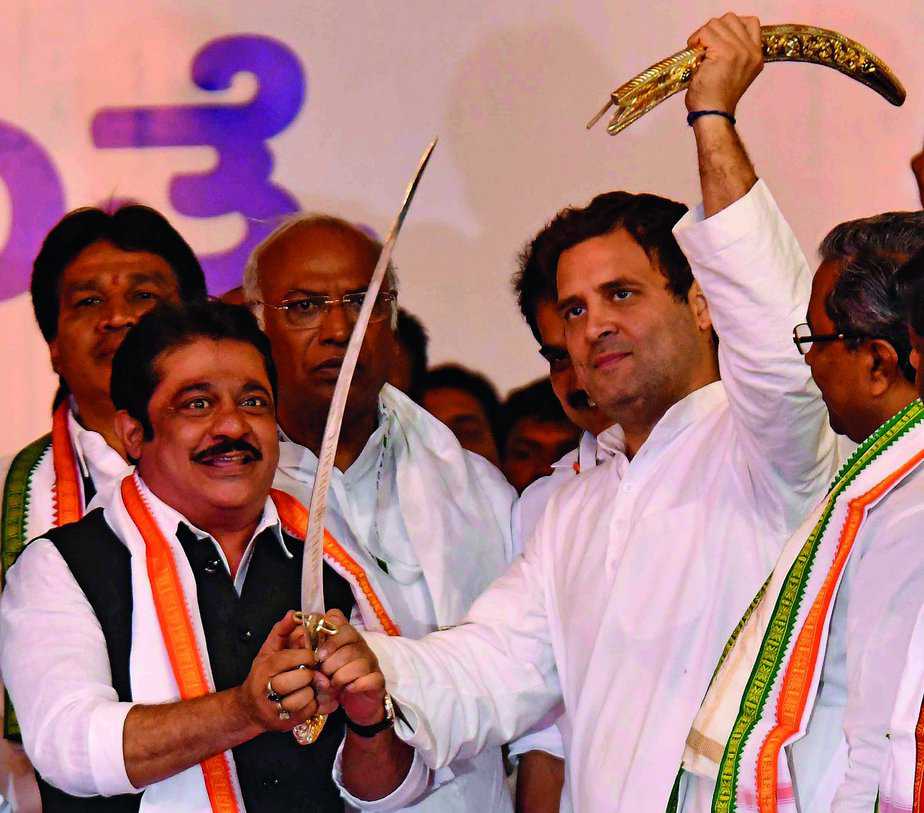
On the campaign trail in southern Karnataka, Rahul Gandhi took a break from targeting the Bharatiya Janata Party. Instead, he trained his guns at the Janata Dal (Secular), calling it the ‘B team’ of the BJP. What’s more, the Congress president even insinuated that ‘S’ actually meant Sangh Parivar.
The faint-hearted would think this strategy to go after HD Deve Gowda’s regional outfit is playing with fire. After all, Karnataka has not returned a party to power for a second term since 1985. The state is given to springing a surprise in the form of a hung Assembly like it did in 2004 or leaving the party in the lead tantalisingly short of the halfway mark, like in 2008.
The JD(S) takes the field in every election as the dark horse, with a voteshare hovering around 20 per cent since 2004. When the big two — the Congress and the BJP — gasp for political oxygen, the JD(S), the eternal freelancer, is usually willing to do business with either party. While HD Kumaraswamy was chief minister of a JDS-BJP coalition a decade ago, his party now is in power along with the Congress in the Bengaluru municipal corporation.
What’s more, of the 55 Assembly seats in the eight districts in the southern Karnataka region, barring Bengaluru, the Congress won 25 in 2013 while the JD(S) took home 23. As the numbers suggest, Gowda and party are a formidable force in this belt.
The argument therefore is if JD(S) manages to win about 40 seats, the tally it got five years ago, it could hold the balance of power in the event of a hung verdict.
The Siddaramaiah camp does not think so. It sees every reason to attack the JD(S) on Gowda’s home turf. But what explains the Congress adopting such a virulent anti-JD(S) position?
For one, it clearly suggests the Congress strategy in Karnataka is being driven mainly by Siddaramaiah. The old Mysuru region, like it is for Deve Gowda, is also the chief minister’s backyard and Gandhi, it seems, is letting him lead the way.
Siddaramaiah hails from the JD(S) stable and relations between him and the Gowda parivar have only soured since his exit in 2006. The CM knows that should the Congress fall short of numbers, Gowda is unlikely to support a Congress-JDS government with him at the helm of affairs. With Gandhi personally attacking the JD(S), it will make it difficult for the Congress as a party to ask for support from Gowda. This way, Siddaramaiah is also spiking the chances of any other chief ministerial hopeful emerging within the Congress.
That Siddaramaiah did not want to do business with Gowda was clear from the manner in which he fielded three candidates in the Rajya Sabha polls, refusing to let go of one seat for JD(S) party’s BM Farooq. The father-son duo of Gowda and Kumaraswamy could have been softened for the future with a friendly gesture but the CM decided against it. He had already poached seven JD(S) legislators who joined the Congress, spoiling relations. Siddaramaiah also admitted businessman MLA Ashok Kheny into the Congress, whose rivalry with Gowda is the worst-kept secret in Karnataka.
The Congress is also aware of the damage the JD(S) can do even in constituencies in the rest of Karnataka where it has no chance of winning. By taking a few thousand votes, mostly of the Vokkaliga community, it can adversely affect the chances of the Congress candidate, thereby helping the BJP to win. Which is why Siddaramaiah is dubbing the JD(S) as a “vote cutting party”. The Rahul Gandhi offensive was to sow the seeds of doubt in the traditional JD(S) voter, particularly the Muslim and the Dalit, hoping he or she will now think twice before plumping for the party.
The best case scenario for the Congress is if there is a straight contest against the BJP. That’s because the votebanks of the JD(S) and the BJP, given their traditional community support, do not overlap. On the contrary, the JD(S) and the Congress woo the same Vokkaliga and Muslim communities. Siddaramaiah would like to reduce what he sees as the political nuisance value of the JD(S) with this aggressive approach.
What’s interesting is that Gowda’s alliance partners in Karnataka are the friends of the Congress in Uttar Pradesh and Maharashtra. The JD(S) has a tie-up in place with the Bahujan Samaj Party and Nationalist Congress Party. This creates an added headache for Siddaramaiah as Mayawati’s Dalit candidates could eat into the Congress kitty in the 20 seats allotted to the BSP.
But in case Karnataka gives a confused verdict, it is Gowda’s national allies who may have to step in to soothe frayed tempers in order to ensure the JD(S) does not get saffronised. As far as he is concerned, Siddaramaiah would hope his pinch-hitting with some good running between the wickets by Rahul Gandhi would ensure the Karnataka match won’t go down to the wire.
This article was first published in Newslaundry.
Delhi hosted what organisers describe as the world’s first player auction in golf, launching ‘72…
An elderly woman recalls how her six-year-old granddaughter lay bleeding after a speeding car hit…
Municipal Corporation of Delhi plans a unified policy enabling RWAs to adopt and maintain parks…
A 17-year-old boy allegedly died by suicide after jumping before a moving train at Uttam…
Delhi High Court grants bail to 26-year-old Thar driver accused of mowing down two in…
Two Rohini men arrested for fatally stabbing one person and injuring another during a robbery…